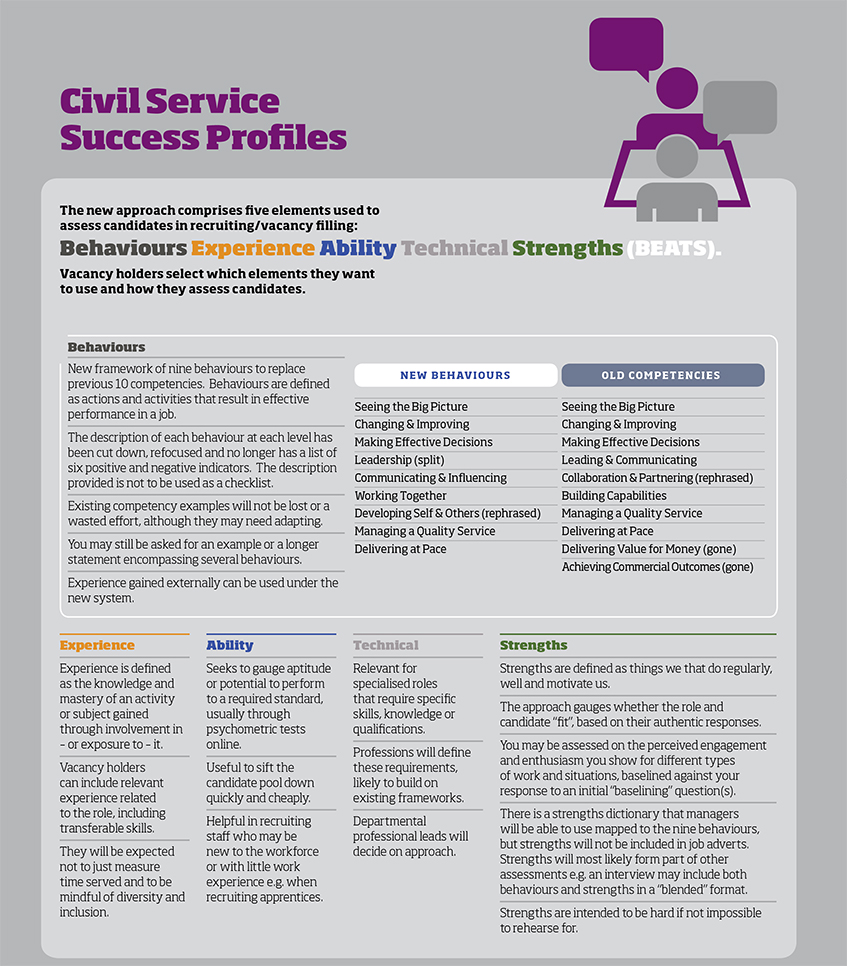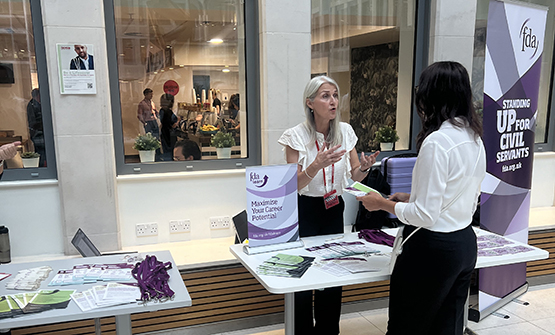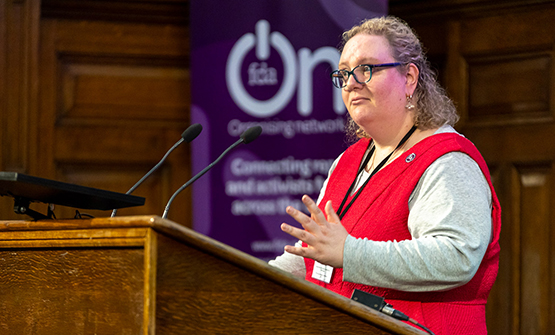Marching to a new BEATS
Neil Rider outlines the new civil service approach to recruiting, including its move away from competencies and towards behaviours.

From April this year, ‘early adopter’ departments begin to road-test a new system for recruitment and job advertising to replace the current Civil Service Competency Framework (CSCF, in use since 2012). The basics of the new approach are shown opposite. In essence, instead of being based on the ability to write and speak to a series of competency examples, employers will now use the five different elements of the new system: Behaviours, Experience, Ability, Technical and Strengths (‘BEATS’). The FDA has been working closely with Civil Service Employee Policy (CSEP) at the consultation stage and as the new system is being trialled, not least to ensure that FDA Learn training offers are compatible with the changes as they roll out. Most importantly, we want to ensure that this is a system our members can work with.
Addressing inequalities
The move from competencies to behaviours is especially welcome. Members are often frustrated at their chances of being shortlisted resting on how well they can frame a 250-word example based on their roles over the last two years. The introduction of “situational” (If you were required to… how would you…) in addition to the more familiar “past behavioural” (Tell me about a time when you…) questions should help address some potential inequalities of the current system. There is also a mooted removal of strict age limits on examples and a move towards encouragement of external examples, within reason. For those who have taken career breaks, had periods of illness or taken time off to bring up a family, this should all be good news.Perhaps a much greater concern has been the adoption of “Strengths”. This is to be assessed on the reaction to questions based on 36 strengths linked to behaviours. As I have a close relative with an autism spectrum disorder who may not easily display enjoyment, passion or engagement, I admit this is personal to me. The FDA is keen to ensure that a strength is not literally seen in terms of visible passion and enthusiasm – it has to be more nuanced than that.
We are encouraged by CSEP’s response and willingness to engage. The position it takes is that baselining (identifying how an interviewee expresses engagement through neutral questions, before going on to assess against that baseline) is the way to ensure a fair approach. That will be down to assessor training, which will be quality assured. The ‘Train the Trainer’ sessions seem well-focused and effective, but we feel strongly that those attending ‘Train the Trainer’ then cascading the information in short sessions is not sufficient.
Not all training can be delivered in a classroom-based approach, and FDA Learn is ready to help with that. However, any blended approach should involve a face to face element and consider diversity, as well as an annual refresh.
As an assessor and trainer, it’s clear that this training has not been all that it could be for the last five years or so. Over the last year, I’ve spoken to more than 200 FDA members who assess and interview. Few report having received more than online unconscious bias training, with none recalling receiving a refresh. That has to change – we hope to secure clear commitment to that on the record. The FDA does welcome new entrants not being expected to have the same level of experience as other candidates for roles where that is not a reasonable requirement, such as apprenticeships. However, we are keen that the system also supports more long-standing workers to ensure their experience is held to be valuable, especially in workforce change situations.
Joined-up working
As well as talking to CSEP and employers, FDA Learn does itself offer courses. We will be running classroombased events and working with employers to support their offer around the new processes as well as enhancing what we currently provide.
Overall, we are positive about the new system, but repeat the point we have been making for years about joined-up working. Ever since Professional Skills for Government we have argued that approaches to development should be part of a common framework for public delivery roles. The union has welcomed speakers as diverse as John Redwood, Lord Bichard, Francis Maude and Will Hutton onto our policy platforms to make that point. Recently the union has been approached to discuss this issue on a broader scale, so watch this space.
Neil Rider is the FDA’s lead for FDA Learn and Keyskills.
Related News
-

FDA launches its Autumn organising roadshow
As part of the union’s work to improve its local visibility, the FDA launched its Autumn organising roadshow at the Ministry of Justice building in Petty France, London.
-

FDA responds to independent learning review for Ofsted
The FDA has welcomed Ofsted’s positive response to the Gilbert Review and committed to work with the organisation to deliver on the recommendations made.
-

Meet the President: Margaret Haig
The FDA’s newly elected President Margaret Haig discusses with Katherine Hutchinson the key challenges facing the civil service, and lays out the best things about being part of the union.